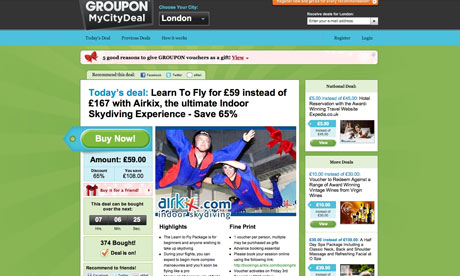The Groupon website. When Sally Blenkey-Tchassova first started her burlesque dance classes in New York last summer, she said she was lucky to get four students. Now she has 800 new clients on her books. Lady Gaga's love of the raunchy dance style and the new movie Burlesque, starring Cher and Christina Aguilera, have helped. But the British-born entrepreneur credits one company in particular with really giving her business a high kick: Groupon, a two-year-old internet startup that may be the fastest-growing firm in history and has just spurned a $6bn takeover bid from Google.
Chicago-based Groupon is the hottest company of the moment in the US technology industry. Its decision, late on Friday, to walk away from a multibillion-dollar buyout by the world's biggest internet search company is a sign of remarkable audacity on the part of founder Andrew Mason, a doggedly wacky 29-year-old.
Groupon specialises in providing customers with discounts that are triggered when they encourage friends, family and colleagues to purchase in bulk. Its 12 million subscribers are emailed one deal a day, tailored to their location and profile. Groupon has rivals, including LivingSocial and the UK's Groupola, but it's the biggest group-discounts website and has global ambitions; local deals on items ranging from breakfast at a tea shop in Manchester to tickets for museum shows in Chicago soon add up. Analysts calculate the local advertising market is worth more than $300bn globally. And the talk in Silicon Valley is of how much Mason believes his business is worth if Google's $6bn was insufficient – a tidy $7bn? Or even $10bn?
Blenkey-Tchassova offered a Groupon promotion on her Burlesque Bikini Bootcamp last week – 10 classes for $49 rather than $99. She sold 800 within hours. Half that goes to Groupon, but Blenkey-Tchassova is confident the sale was just the start. "These are my customers now," she says.
But while Gaga groupies might find Groupon a bargain, Google's investors reacted badly last week to rumours of the $6bn offer. At that price, Groupon would have been Google's largest acquisition, dwarfing its $3.1bn purchase of DoubleClick, the internet advertising company, in 2007.
Groupon is a very different business to past targets of Google. For a start, it relies more on people than algorithms and Mason has publicly worried about losing his corporate identity. Groupon has a staff of 3,000 and Mason has described it as a "hybrid human-technology company". The firm employs comedy writers to come up with witty ad copy. Mason too likes a joke: he once hired a man to walk around the office in a ballerina outfit for a week, with no explanation. "It's about shocking people into feeling alive," Mason said in an interview.
Other start-up entrepreneurs who have sold out to Google have privately complained about culture clashes once they have been absorbed by the increasingly monolithic search firm. "I worry about the unknown of what it means to be a bigger company," Mason said in a recent speech.
But at current rates Groupon will soon be a big firm whatever happens. While Groupon is focused on local business, it has also expanded to national deals. Last summer, it ran a Gap promotion that generated $11m in revenue in one day. Analysts estimate that Groupon has annual revenue of more than $500m; Mason has said the company is profitable, but no figures are available. Before Groupon, the fastest growing internet company was Zynga, the social-network games developer behind Farmville. It took three years to hit the revenue levels Groupon has reached in two, according to Lou Kerner at analysts Wedbush.
Local is hot on the web. Amazon is believed to be close to investing $150m in LivingSocial. And Google has been beefing up its local presence. It tried to buy Yelp, a local reviews site, last year and has put rising star Marissa Mayer in charge of its local and geographically based business. Even at $6bn, Groupon wouldn have dented Google's reserves. It has about $33.4bn in cash or cash equivalents on hand.
Sandeep Aggarwal, an analyst at San Francisco's Caris & Co, thought buying Groupon would have been smart. "So far, no one has cracked the code to bring all local merchants online but Groupon has the most compelling model, in our view," he said in a note to investors. He said Groupon could have offered Google another $1bn business opportunity outside its core search business. Many of Google's 1.2 million advertisers could benefit a lot from a Groupon-type offer, he believes.
Blenkey-Tchassova also runs a spray tanning salon and says she has run several deals with Groupon and its rivals. "There are so many companies doing it now, but Groupon is the mothership," she says. "They are very methodical, very precise. The results are amazing. I think they offer the best deal in town." Google may never know.


